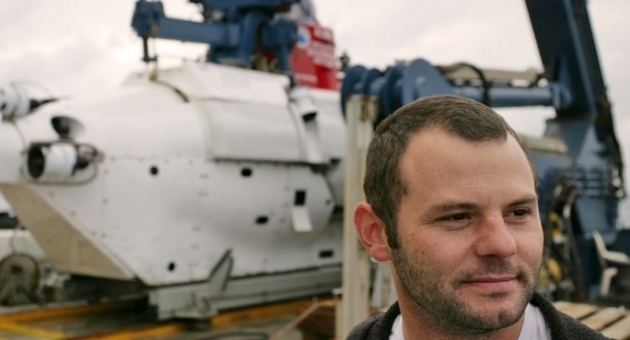Research cruise to explore ocean acidification; film to document the rising problem

Erik Cordes, marine biologist and assistant professor of biology at Temple, will lead an NSF-funded, three-week research cruise in the Gulf of Mexico to explore the effects of rising ocean acidification in the deep sea and on deepwater corals specifically.
The cruise will take place next spring aboard the state-of-the-art research vessel Atlantis, operated by the Woods Hole Oceanographic Institute. The researchers on the cruise will make a series of dives from the ship in the newly refurbished submersible Alvin.
“The carbon dioxide in the atmosphere is working its way into the ocean,” said Cordes, who leads the only deepwater research group examining the issue of ocean acidification. “There has been a lot of attention focused on acidification in shallow waters, but the fact is, the first effects of acidification are being felt in the deep sea.”
Cordes said that acidification is making it harder for organisms such as deepwater corals to lay down their skeletons on the ocean floor and will begin dissolving them in the future.
“Oysters are also a great example,” he said. “The rising acidification is turning their shells softer, and it has actually had a significant impact on some of the oyster fisheries off the coast of Washington state.”
During these dives thousands of feet to the ocean floor, Cordes and his collaborators will be collecting deepwater coral samples, while searching for strains of corals more resistant to the rising acidification.
“We will also be bringing these samples back to our lab for genetic testing to determine what makes these species of corals able to persist in this growing acidic environment,” he said.
Accompanying Cordes on the research cruise will be two of his longtime friends, filmmaker Ivan Hurzeler and producer Kurt Langer, who will film a documentary about Cordes’ research into ocean acidification. The documentary is titled Acid Horizon.
“The idea of this documentary is to make people aware of these really amazing habitats at the bottom of the ocean and the rising threat they are facing from ocean acidification,” said Cordes. “We’ve been talking about this film for years, and it’s just now that we are all at positions in our various careers where we can make this documentary a reality.”
Cordes, Hurzeler and Langer have recently launched a Kickstarter campaign to help raise funds to support the making of the documentary.
“The funding from NSF is paying for the cruise and all the science, but we have to raise funding from the public to help us make this film—which will hopefully bring the science to as wide an audience as possible,” Cordes said.
To learn more about Acid Horizon or to contribute to the Kickstarter campaign, visit acidhorizon.com.